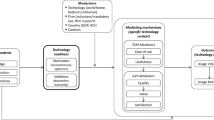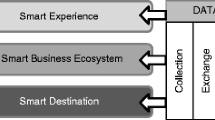Abstract
New technologies (NT) have entered the field of tourism with both the hospitality sector and the cultural sector to be challenged by this new reality. Notwithstanding the benefits from the adoption of NT, possible drawbacks and hindrances that might delay their incorporation and embracing in the aforementioned sectors. Understanding and comparing the attitudes of the hotel managers and curators are important in this venture. The current paper is based on two explorative surveys, one for hotel managers and one for museum curators and the results have been analyzed in a qualitative manner. Consistent with their humanities discipline educational background, curators envisage the NT away from basic economic principles, but appear to be more positive and knowledgeable of NT. Conversely, hotel managers with their business administration background and younger than the curators surprisingly seem to have a more constrained vision and update of the technology evolution. Findings from the current study can encourage policy making and customized training interventions in different fields of tourism management.
Similar content being viewed by others
References
Adeyinka-Ojo, S., Lee, S., Abdullah, S. K., & Teo, J. (2020). Hospitality and tourism education in an emerging digital economy. Worldwide Hospitality and Tourism Themes, 12, 113–125.
Alexakis, G., & Jiang, L. (2019). Industry competencies and the optimal hospitality management curriculum: An empirical study. Journal of Hospitality & Tourism Education, 31, 210–220.
Atef, T., Megahed, F., & Hewedi, M. (2010). Managers training and development in the Egyptian hospitality industry. In M. Kefalaki & D. Tixier (Eds.), Challenges and Prospects in Tourism Research. Athens Institute for Education and Research.
Balducci, F., Buono, P., Desolda, G., Impedovo, D., & Piccinno, A. (2020). Improving smart interactive experiences in cultural heritage through pattern recognition techniques. Pattern Recognition Letters, 131, 142–149.
Becherel, L., & Cooper, C. (2002). The impact of globalisation on human resource management in the tourism sector. Tourism Recreation Research, 27, 1–12.
Bowen, J., & Morosan, C. (2018). Beware hospitality industry: The robots are coming. Worldwide Hospitality and Tourism Themes, 10, 726–773.
Bruess, L. (2003). University ESL instructors' perceptions and use of computer technology in teaching. University of New Orleans.
Buergermeister, J. (1983). Assessment of the educational skills and competencies needed by beginning hospitality managers. Hospitality Education and Research Journal, 8, 38–53.
Cedefop. (2011). Study visits catalogue 2011/2012. Luxembourg: Publications Office of the European Union. https://www.cedefop.europa.eu/files/4097_multi.pdf
Davis, F. D. (1986). A technology acceptance model for empirically testing new end-user information systems: theory and results. Massachusetts Institute of Technology.
Dredge, D., Phi, G., Mahadevan, R., Meehan, E., & Popescu, E. S. (2018). Digitalization in Tourism: In depth analysis of challenges and opportunities. European Commission.
Elias, S. M., Smith, W. L., & Barney, C. E. (2012). Age as a moderator of attitude towards technology in the workplace: Work motivation and overall job satisfaction. Behaviour & Information Technology, 31, 453–467.
European Commission (2007). FP7 in Brief. Accessed January 17, 2020, from https://ec.europa.eu/research/fp7/pdf/fp7-inbrief.en.pdf
Fraser, B. (2020). From Hospitality Classrooms to Successful Careers: A Current Appraisal of Australian International Hotel Requirements. Journal of Hospitality & Tourism Education, 32, 234–254.
Flick, U. (2009). An introduction to qualitative research (4th ed.). Sage Publications.
Gupta, J., Mitra, B., & Garg, K. (2021). Technological disruptions reshaping management education: A qualitative study of stakeholder perspectives. International Journal of Management in Education, 15(2), 179–198.
Hertzfeld, E. (2017). Training users on new hotel technology no simple task. Accessed on April 24, 2021, from https://www.hotelmanagement.net/tech/do-tech-companies-offer-training-needed
Hisham, O., Al-Mobaideen, Al-Adaileh, R., Sattam, R., & Allahawiah, S. (2012). Managers’ attitudes towards web and information technology: a study of public sector managers in Jordan. https://www.researchgate.net/publication/330204497_Managers%27_Attitudes_towards_Web_and_Information_Technology_A_Study_of_Public_Sector_Managers_in_Jordan
Hussein, Z. (2017). Leading to intention: The role of attitude in relation to technology acceptance model in e-learning. Procedia Computer Science, 105, 159–164.
Ivanov, S., Seyitoğlu, F., & Markova, M. (2020). Hotel managers’ perceptions towards the use of robots: A mixed-methods approach. Information Technology & Tourism, 22, 505–535.
King, W. R., & He, J. (2006). A meta-analysis of the technology acceptance model. Information & Management, 43(6), 740–755.
Landfester, U., & Metelmann, J. (2021). De-disciplining humanity: The humanities’ case for Critical Management Literacy. Management Learning, 52, 144–164.
Legris, P., Ingham, J., & Collerette, P. (2003). Why do people use information technology? A critical review of the technology acceptance model. Information & Management, 40(3), 191–204.
Mantle-Bromley, C. (1995). Positive attitudes and realistic beliefs: Links to proficiency. The Modern Language Journal, 79(3), 372–386. https://doi.org/10.1111/j.1540-4781.1995.tb01114.x
Mason, J. (2002). Qualitative researching (2nd ed.). Sage Publications.
Menegaki, A. N., & Agiomirgianakis, G. M. (2018). Sustainable technologies in Greek tourist accommodation: A quantitative review. European Research Studies Journal, 21, 222–238.
Menegaki, A. N., & Agiomirgianakis, G. M. (2019). Sustainable technologies in tourist accommodation: A qualitative review. Progress in Industrial Ecology, 13, 373–400.
Menegaki, A. N. (2020a). A Qualitative Study on Curators’ Preferences about New Technologies in Museums with Their Operational State of the Art. https://doi.org/10.2139/ssrn.3699267
Menegaki, A. N. (2020b). A Qualitative Study of Hotel Managers’ Preferences on New Technologies. https://doi.org/10.2139/ssrn.3756200
Menegaki, A. N. (2021). Museum Curators and Hotel Managers in Front of New Technologies and Their Training Needs Differential. https://doi.org/10.2139/ssrn.3769117
Quattrini, R., Pierdicca, R., Paolanti, M., Clini, P., Nespeca, R., & Frontoni, E. (2020). Digital interaction with 3D archaeological artefacts: evaluating user’s behaviours at different representation scales. Digital Applications in Archaeology and Cultural Heritage, 18, e00148.
Shehade, M., & Stylianou-Lambert, T. (2020). Virtual reality in museums: Exploring the experiences of museum professionals. Applied Sciences, 10, 4031. https://doi.org/10.3390/app10114031
Skoumpopoulou, D., Wong, A., Ng, P., & Lo, M. (2018). Factors that affect the acceptance of new technologies in the workplace: A cross case analysis between two universities. International Journal of Education and Development Using Information and Communication Technology, 14, 209–222.
Triandis, H. (1971). Attitude and attitude change Wiley foundations in social psychology. John Wiley & Sons Inc.
Užule, K., Kuzmina-Merlino, I., & Merlino, M. (2020). Modern Managers in Gig Economies: Competencies, Personality and their Effect on Manager Education in the Digital Era. In International Conference on Reliability and Statistics in Transportation and Communication (pp. 613–622). Springer, Cham.
Willis, M., Duckworth, P., Coulter, A., Meyer, E. T., & Osborne, M. (2020). Qualitative and quantitative approach to assess the potential for automating administrative tasks in general practice. BMJ open, 10, e032412.
Xiang, Z., & Fesenmaierm, D. (2017). Big data analytics tourism design and smart tourism. Springer.
Author information
Authors and Affiliations
Corresponding author
Additional information
Publisher's Note
Springer Nature remains neutral with regard to jurisdictional claims in published maps and institutional affiliations.
Rights and permissions
About this article
Cite this article
Menegaki, A.N. New Technologies in Hotels and Museums: Supply-side Perceptions with Education Implications for Managers and Curators. J Knowl Econ 13, 2935–2956 (2022). https://doi.org/10.1007/s13132-021-00849-z
Received:
Accepted:
Published:
Issue Date:
DOI: https://doi.org/10.1007/s13132-021-00849-z




